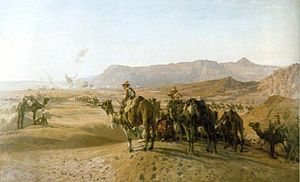Wikipedia:WikiProject Military history/News/August 2011/Book reviews
|
Carthage Must be Destroyed - Richard Miles[edit]

![]()
![]()
![]()
![]()
![]()
Carthage Must be Destroyed is a general history of Ancient Carthage which has a strong focus on the Punic Wars which were fought between Carthage and the rapidly rising Roman Empire. The book was written by the academic historian Richard Miles and it succeeds in providing an accessible yet detailed account of the history of the rise and fall of Carthage.
Carthage Must be Destroyed traces the history of the Carthage from its establishment as a Phoenician settlement until its destruction by Rome. A particular strength of the book is that it places Carthage in the context of the other settlements and states in the Mediterranean region - this goes a long way to explaining how Cathage rose to economic and military prominence yet was ultimately over powered. The coverage of Carthage's military and wars is comprehensive, and Miles provides detailed accounts of the diplomatic maneuverings. The coverage of campaigns and major battles is relatively limited, but this is appropriate for a general history. The narrative is well supported with clear maps and photographs of Punic artifacts and ruins.
An interesting aspect of the book is its emphasis on the Mediterranean states' claims to have inherited the legacy of Hercules, as well as the other competing religious beliefs at the time. While this is convincing (particularly in the case of Hannibal's success in deliberately emulating Hercules), I felt that Miles' gave too great an emphasis to religious matters at times and this undermined his very solid analysis of the more prosaic economic and military factors which influenced the competition between the states. Nevertheless, this is only a minor limitation to an excellent book. Nick-D (talk) 09:59, 4 August 2011 (UTC)
- Articles this book will be useful for: Ancient Carthage, Punic Wars and related articles
- Publishing details: Miles, Richard (2010). Carthage Must be Destroyed : The Rise and Fall of an Ancient Civilization. London: Penguin. ISBN 9780141018096.
Australia's Palestine Campaign - Jean Bou[edit]

![]()
![]()
![]()
![]()
![]()
Over the last few years the Australian Army's Army History Unit has published a series of 150-200 page books which aim to provide soldiers with an overview of some of the Army's campaigns. These books have been written by well regarded military historians and are heavily illustrated with maps and photographs. Australia's Palestine Campaign is the seventh book in this series, and provides a general overview of the activities of the Australian Light Horse, No. 1 Squadron AFC and other Australian units during the Sinai and Palestine Campaign.
Australia's Palestine Campaign is a highly successful book. As well as covering the main Australian battles in the campaign in an appropriate level of detail, Bou does a good job of describing how the Australian forces were organised and the tactics they used. His descriptions of how the units adapted to the conditions in the theatre and learned from their experiences are particularly interesting. Despite the book being targeted at a young audience who are unfamiliar with this campaign, Bou generally doesn't pull punches when discussing the shortcomings of the Australian units in the campaign and goes out of his way at times to disprove myths. He is also careful to place the Australian contribution in its context by describing how the Australian units were normally operated alongside British, Indian and New Zealand forces.
The book does have some limitations though. While it is illustrated with a large number of photos, the decision to not include a map showing the entire region covered by the book seems inexplicable given that the region's geography is unfamiliar to most Australians, and many of the other maps seem a bit crowded. The boxes placed throughout the text describing key weapons and personalities also are also distracting at times, and many could have been integrated into the narrative.
Overall, Australia's Palestine Campaign is very worthwhile. Due to its good analysis of the role of the Australian units, it is likely to be of interest to people familiar with this campaign as well as those looking for an introductory overview. Nick-D (talk) 01:57, 27 August 2011 (UTC)
- Articles this book will be useful for: Military history of Australia during World War I, Sinai and Palestine Campaign and the units involved in this campaign
- Publishing details: Bou, Jean (2010). Australia's Palestine Campaign. Australian Army Campaigns Series – 7. Canberra: Army History Unit. ISBN 9780980810004.
Recent external book reviews[edit]
- France, John (2011). Perilous Glory : The Rise of Western Military Power. New Haven: Yale University Press. ISBN 0300120745.
- Malcolm, Noel (25 August 2011). "Perilous Glory: The Rise of Western Military Power by John France: review". The Telegraph.
- Wick, Steve (2011). The Long Night : William L. Shirer and the Rise and Fall of the Third Reich. New York: Palgrave Macmillan. ISBN 0230623182.
- Garner, Dwight (9 August 2011). "A Foreign Correspondent in Nazi Germany Who Interpreted It for the World". The New York Times.
- Reid, Anna (2011). Leningrad : The Epic Siege of World War II, 1941-1944. New York: Walker & Co. ISBN 080271594X.
- "900 days of solitude". The Economist. 27 August 2011.
- Kershaw, Ian (2011). The End : Hitler's Germany, 1944-45. London: Allen Lane. ISBN 9780713997163.
- Shephard, Ben (21 August 2011). "The End: Hitler's Germany, 1944-45 by Ian Kershaw – review". The Guardian.
- Doyle, William (2011). A Soldier's Dream : Captain Travis Patriquin and the Awakening of Iraq. New York: New American Library. ISBN 0451230000.
- Perry, Tony (20 August 2011). "Book review: 'A Soldier's Dream' by William Doyle". Los Angeles Times.

